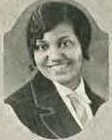Life of Resilience: Maxine Maxwell and the First Protest Against UO Discriminatory Housing Regulations

“My family has always had to fight, and we have maintained a creditable position in Salem, where I have lived all of my life. I do not feel that I am a “foreigner” and that I should be segregated from other students, although I do not want to make trouble for anyone.” – Maxine Maxwell, Eugene Register, October 2, 1929
Continuing our series highlighting the work of historian Herman L. Brame in honor of Black History Month, we bring you the story of Maxine Maxwell. She was raised in Salem, Oregon and was a member of a resilient family that was highly respected and well known. Her father, Charles Maxwell, was a successful businessman who operated the restaurant “Fat Boy Barbecue” and a shoeshine shop in the Hollywood district of the city. He also ran a small neighborhood publication that enabled him to have significant political influence among the African American community. Despite his success, not everyone was enthused about his accomplishments. The 1920s were the heydays of the Ku Klux Klan in the state of Oregon, and Mr. Maxwell’s success drew their attention. In 1922, Mr. Maxwell received a letter from Klansmen that stated, “We have stood you as long as we intend to stand you, and you must unload, if you don’t we will come to see you.” However, Mr. Maxwell had no intention on leaving his home and responded by allowing his letter to be published in the Capitol Journal. He bravely called out the Klansmen and declared himself unafraid of their threats. His daughter, Maxine Maxwell would show similar courage and resilience when she attended the University of Oregon.
As a high school student, Maxine Maxwell was a talented singer and dancer and dreamt of attending college to study physical education and music. In the fall of 1928, she attended Oregon Agricultural College (now Oregon State University) where African Americans were permitted to live in campus dormitories, but only if they roomed with other “negroes.” Although she faced racism from other students, she generally enjoyed her time at Oregon Agricultural College and was even involved in the Winema Club with her roommate D. Coleman. After one year at the institution, she decided to transfer to the University of Oregon because it was the only university in the state that offered physical education as a major. It also provided opportunities for her to continue with music.
Although looking forward to new experiences at the University of Oregon, she did expect she would be forced to live off campus. While preparing to transfer to the UO, she applied to live in a room at Susan Campbell Hall and was notified that she was granted one. However, while moving in, campus officials confronted her, saying that they did not realize she was African American. She was then assigned to live in an apartment 10 blocks from campus with another “negress” named Nellie Franklin. In addition to Maxwell and Franklin, Louise Lewis was only other African American woman at the UO at that time. UO, like many other colleges in the US during this period, did not possess environments that provided welcoming spaces for African Americans, especially African American women- a trend that disappointingly continues today.
Maxwell and her parents were the first African Americans to protest the university’s discriminatory housing policies that excluded African American women from the dormitories. The conflict between the Maxwells and the University President and Governor caught statewide attention in newspapers and sparked an increase in racial tensions on campus. Despite their efforts, Maxine Maxwell was still denied housing at the University of Oregon because of her race. As a result, she made the decision to withdraw from the University of Oregon on October 4, 1929. However, she did not give up on her education, but rather remained resilient and sought to continue at an institution out of state. Her father and the rest of the family also decided to leave Oregon because of business problems and so moved to Los Angeles, California. Maxine Maxwell’s conflict with university administration led to stricter and more clearly defined discriminatory student campus housing policies that would last until the 1940s, but her protest of campus injustices paved the way for future student activism.
Information for this article was collected from the following source:
Paulla Santos
Student Research Assistant

